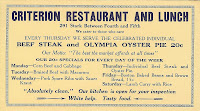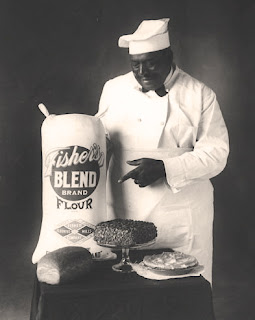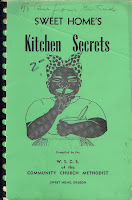“Blend’s Mah Friend”

 |
| Recipe leaflet, ca. 1894 |
There’s a lengthy history of food-related imagery depicting African Americans. The legacy of black American women and men as good cooks is evident in Uncle Ben’s rice and Aunt Jemima’s syrup.
The Pacific Northwest’s history of discouraging black residency is brightly reflected in its historically small black population. But by the 1890s, the new transcontinental railroads had hired black porters and waiters to staff their dining and sleeping cars. This established a small nucleus of African American residents in Portland, Tacoma, and Seattle. The Portland Hotel—begun by the Northern Pacific Railroad—had a black waitstaff.
 |
| Portland, ca. 1915 |
Throughout the region, blacks were seldom visible. Despite the association of blacks with good service (and proper servility) on railroads and in big-city hotels, some establishments explicitly noted their absence as a positive point.
 |
| A. Curtis photo, 1915. UW Libraries |
The Fisher Flouring Mills of Seattle (with mills also in Tacoma and Portland at times) offers one of the few instances of a regional black figure in Northwest food history. From about 1912 to 1920, Newton Colman (pictured at left) personified Fisher’s Blend flour in local advertising. Until about 1950, a line drawing of a black chef and the phrase “Blend’s mah friend” identified the company and carried a message that linked black men with good cooking.
A curious sidebar to this topic is the existence of several regional community cookbooks with a cover drawing of a black woman cook. I have three examples, from Sweet Home, The Dalles, and Amity, all from 1951, and all printed by the Bev-Ron Publishing Company of Kansas City, Missouri. A quick Google search reveals that Bev-Ron is today Cookbook Publishers, Inc., of Lenexa, Kansas, and that, as in 1951, they will organize, design, and print your community cookbook. And as in 1951, you have a selection of cover templates from which to choose.
In 1951, the Wasco County Chapter of American Gold Star Mothers, the Women’s Society of Christian Service of the Sweet Home Community Church, Methodist, and the Women’s Society of Christian Service of Amity Methodist Church, all chose this cover for their cookbooks. Was it a Methodist Thing?
 |
| Portland Oregonian, May 18, 1926 |
